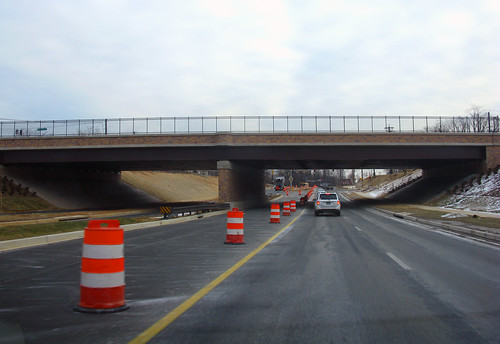Road construction in Montgomery County Maryland, Flickr photo by thisisbossi.
In Ann Arbor, there used to be a local newspaper called the
Ann Arbor News. I always found the letters to the editor column to be interesting, because you'd have a mix of erudite letters from college professors and wacked out semi-illogical letters from residents of Washtenaw County who probably had "less" education.
Major metropolitan newspapers like the Washington Post aren't expected to have the same range of letters to the editor, instead you read community newspapers (like the Northwest Current, the Gazette newspapers in Prince George's and Montgomery Counties, or the Sun-Gazette in Arlington) for the same kind of range, including borderline nutty. The "big" newspapers are only supposed to run smart, intelligent, completely logical letters.
Jeanneret argues that improving efficiency standards for automobiles, requiring more miles per gallon is potentially bad because it will reduce the revenue from gasoline excise taxes.
The solution is easy,
federal gasoline excise taxes haven't been raised since 1993. He alludes to this, but he just can't be direct as he writes:
It’s irresponsible to advance such proposals without acknowledging and attempting to mitigate the adverse effect they would have. Let’s improve fuel efficiency standards, but not at the expense of shortchanging the nation’s crumbling infrastructure.
Mitigate is too weaselish a word (except when you're talking as a planner) if you don't outline the potential mitigation measures at the outset.
ARTBA may be more irresponsible than the government officials Jeanneret is admonishing because by reducing demand for gasoline through improvements to motor vehicles reduces the amount of oil purchased and consumed by the U.S.--since about half of the oil consumed by the U.S. comes from foreign sources, capital outflows from the U.S. are considerable ("balance of payments") negatively impacting the economy overall--not to mention how military policy is shaped by maintaining access to oil, which further drains the U.S. economy.
Fixing the U.S. economy is more important than road builder profits, which can be maintained if ARTBA and others step up and demand increases in the gasoline excise tax.
I've dealt with letters staff in the past, they pay attention to every clause, every sentence, the right punctuation, etc. There's no way they didn't discern the logic gap from sentence to sentence. (And in fairness to the Post, every time they editorialize about the gas tax issue, they do argue for increases.)
Labels: car culture and automobility, externalities and taxation, gasoline excise taxes, transportation planning




0 Comments:
Post a Comment
<< Home